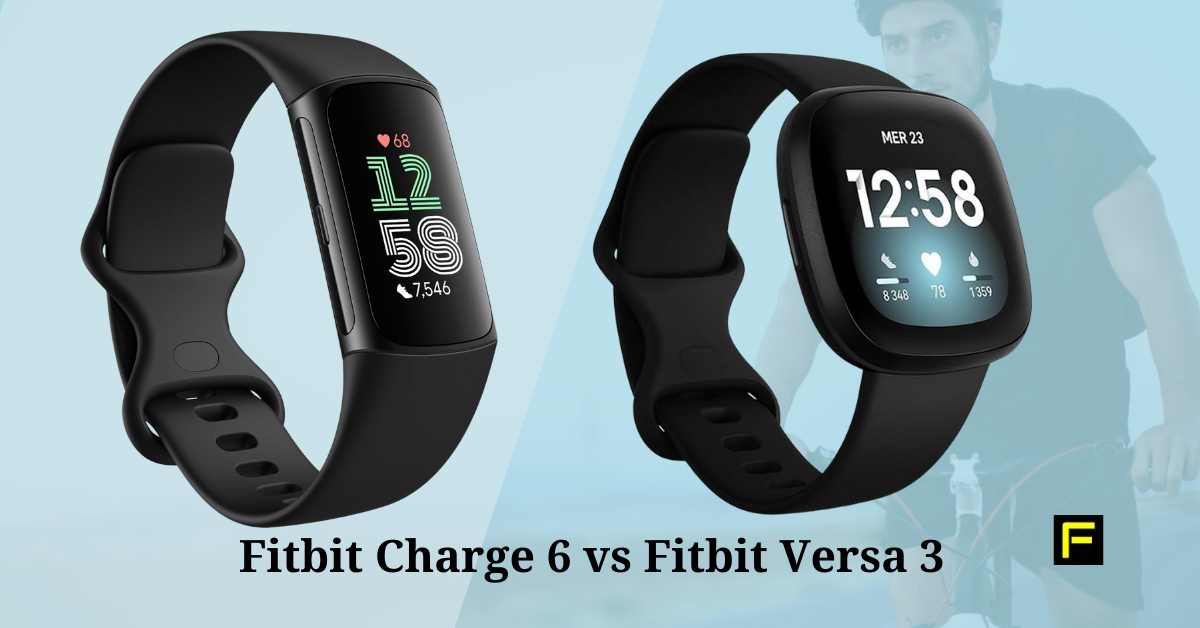In today’s fast-paced world, maintaining a healthy lifestyle is more critical than ever, and fitness trackers have become an invaluable tool for individuals seeking to achieve their health goals. These nifty devices go well beyond just counting steps; they monitor heart rate, track sleep patterns, and even provide insights into stress management. Among the many brands in this market, Fitbit stands out as a leader with its range of high-quality wearable fitness devices.
Fitbit’s wide variety of models, such as the Fitbit Charge 6 and the Versa 3, cater to different preferences and needs. The Charge series is known for its streamlined design and core fitness tracking features, while the Versa line offers a smartwatch experience with additional features beyond health and fitness tracking.
When deciding between models, potential buyers should consider factors such as design preferences, the range of features, battery life, and budget.

Critical aspects to consider when selecting a Fitbit include the specificity of health metrics it captures and the user interface’s ease of navigation. Compatibility with other apps and devices may also influence the decision-making process.
Fitness enthusiasts may prioritize accurate activity tracking and a heart rate monitor, whereas those looking for a lifestyle accessory might prefer a device with smart notifications and music storage capabilities. With thorough research and testing of both devices, we aim to provide insights that help users choose the tracker that best fits their lifestyle.
Fitbit Charge 6 vs Versa 3 Showdown
We’re excited to present our comparison of two standout fitness trackers from Fitbit: the Charge 6 and the Versa 3. Both models are designed to cater to a range of fitness enthusiasts, from casual walkers to dedicated athletes.
We aim to provide an insightful overview that examines the features, functionality, and overall value of each device. With a focus on health metrics, smartwatch capabilities, and user experience, our list prioritizes the information that matters the most for an informed decision.
Versa 3 Smartwatch

For those seeking a balance of fitness tracking and smart features, the Versa 3 hits the sweet spot with its intuitive interface and comprehensive health metrics.
Pros
-
Integrated GPS for phone-free exercise tracking
-
Voice assistant capabilities with Alexa and Google Assistant
-
Impressive 6+ day battery life with fast charging option
Cons
-
Lack of built-in music storage can limit offline playlist access
-
Some advanced features locked behind the Fitbit Premium subscription
-
Occasional delays in syncing with the Fitbit app
During my time with the Versa 3, the built-in GPS proved to be remarkably reliable for outdoor workouts. It allowed me to leave my phone at home without missing a beat. The voice assistant feature was convenient, especially for quick weather checks before a run or setting reminders. Battery longevity is a huge advantage here – I rarely had to worry about charging it during the week.
No products found.Music control right from the wrist is a delightful feature for anyone who likes to have a soundtrack for their workouts. However, without on-device storage, it does depend on being in the range of your phone or Wi-Fi. Interacting with Fitits’s app ecosystem and the watch interface itself felt smooth, although, at times, there were slight holdups in data synchronization.
The Versa 3 feels like an extension of myself after wearing it for just a few days. Sleep tracking and the Daily Readiness Score became indispensable for understanding my health patterns. The sense of motivation from the Active Zone Minutes to push my workouts further was also a significant benefit. It’s more than just a gadget; it’s a valuable companion for anyone serious about their health.
Fitbit Charge 6

If you prioritize health tracking and enjoy Google integration, the Fitbit Charge 6 is a compelling option.
Pros
-
Improved accuracy on body activity sensors
-
The inclusion of Google Wallet and Maps enhances connectivity
-
Comprehensive health features including ECG and SpO2 monitoring
Cons
-
The absence of an altimeter may disappoint elevation-tracking enthusiasts
-
Some users find the GPS less responsive compared to previous models
-
Band compatibility limits to Charge 5, excluding other Fitbit models
Recently, I had the pleasure of using the Fitbit Charge 6. The latest iteration has taken a significant leap from its predecessors in terms of health tracking. The sensors felt more responsive, offering a better gauge of daily activities. ECG and SpO2 measurements were prompt, which for someone as health-conscious as myself, provided great peace of mind.

The integration of Google services like Maps and Wallet turned the Charge 6 into more than just a fitness tracker — it became an extension of my smartphone. The convenience of controlling music and receiving notifications right from my wrist was a feature I didn’t know I needed until I experienced it.
Fitbit’s seven-day battery life is no empty claim; it held strong through a week of constant usage, including tracking sleep and various workouts. The bright, vivid touchscreen remained visible even on sunny runs, making it easy to glance at my stats without breaking stride.
Buying Guide
When considering the purchase of a fitness tracker or smartwatch, it’s important to evaluate a range of features to find the device that best meets your needs. Here are some key factors to consider:
Design and Comfort
- Size: Select a size that fits comfortably on your wrist.
- Weight: A lighter device may be more comfortable during exercise.
- Material: Look for durable materials that can withstand your daily routine.
Health and Fitness Features
- Heart Rate Monitor: Essential for tracking your cardiovascular health.
- Built-in GPS: Important for runners and cyclists to track routes.
- Water Resistance: Necessary for swimmers or those who sweat heavily.
- Sleep Tracking: Helps you understand your sleep patterns.
| Feature | Consideration |
|---|---|
| Heart Rate Monitor | Must-have for cardiovascular health tracking |
| GPS | Crucial for distance tracking for runners/cyclists |
| Water-Resistant | Ideal for swimming and intense workouts |
| Sleep Tracking | Useful to monitor sleep patterns |
Battery Life and Charging
- Battery Duration: Longer battery life means less frequent charging.
- Charge Time: Prefer devices that charge quickly for convenience.
Smart Features and Compatibility
- Notifications: Ensure the device can show essential notifications.
- Compatibility: Check if the device is compatible with your smartphone.
- Apps: Consider the variety and utility of available apps.
Price
- Compare the price with the features offered to determine value for money.
Things to Consider
After evaluating the specifications, we recommend choosing based on the balance of features that align with your fitness goals and lifestyle. If advanced health tracking takes precedence, prioritize devices with a robust health feature set. Conversely, if you’re looking for practicality and extended battery life, consider the device that maximizes these aspects. The best fitness device is one that not only matches your physical activities but also fits seamlessly into your daily life.
Frequently Asked Questions
We’ve gathered some of the most common questions about the Fitbit Charge 6 and Versa 3 to help you understand their differences and capabilities.
What are the differences in battery life between the Fitbit Charge 6 and the Versa 3?
The Fitbit Charge 6 boasts a long battery life that typically lasts up to 7 days, depending on usage. In contrast, the Versa 3 offers about 6 days of battery life, which can also vary based on usage patterns.
How do the fitness tracking capabilities compare between the Fitbit Charge 6 and the Versa 3?
Both devices are equipped with a variety of fitness-tracking features, including heart rate monitoring, step counting, and sleep tracking. However, the Versa 3 includes additional workout modes and the ability to store and play music, which could enhance the fitness experience for some users.
Which device offers a more comprehensive health monitoring experience: the Fitbit Charge 6 or the Versa 3?
The Versa 3 expands on the health monitoring features by including an on-wrist skin temperature sensor and the ability to perform an ECG, which the Charge 6 does not offer. Both models track heart rate 24/7 and provide detailed sleep analysis.
Can the Fitbit Charge 6 support smartwatch features similar to the Versa 3?
While the Charge 6 offers some smartwatch capabilities like smartphone notifications and contactless payments, the Versa 3 is more akin to a traditional smartwatch, with a larger display for apps and calls, voice assistant support, and the ability to answer calls directly from the wrist.
What are the differences in display and design between the Fitbit Charge 6 and the Versa 3?
The Charge 6 features a slim, sleek design with a monochrome OLED display, optimized for fitness tracking and day-to-day wear. The Versa 3 has a larger, color square-shaped display, offering a more robust interface suitable for interacting with apps and notifications.
How is the Fitbit Versa 3’s user interface experience compared to that of the Fitbit Charge 6?
The Versa 3’s user interface benefits from its larger touchscreen, which provides more space for navigation and interaction with apps. The Charge 6, with its smaller screen, focuses on simplicity and glances at fitness data, which some users might prefer for ease of use.
Recommendation
When choosing between the Fitbit Charge 6 and the Versa 3, we recommend evaluating your specific needs and preferences.
For those who prioritize a sleek, lightweight tracker focused on comprehensive fitness tracking, the Fitbit Charge 6 is the ideal choice. It offers robust health metrics and is optimized for continuous wear, making it perfect for fitness enthusiasts who need something unobtrusive.
Fitbit Versa 3, on the other hand, is tailored for users looking for a smartwatch with fitness-tracking capabilities. It blends the functionality of a smartwatch with health monitoring features, resulting in a versatile device suitable for both workouts and everyday use.
| Features | Fitbit Charge 6 | Fitbit Versa 3 |
|---|---|---|
| Design | Compact, band style | Smartwatch |
| Display | Smaller, more discreet | Larger, color AMOLED |
| Smart Features | Limited | Extensive (voice assistant, calls) |
| Battery Life | Up to 7 days | Up to 6 days |
| Fitness Focus | Highly focused | Balanced with smartwatch features |
We recommend the Fitbit Versa 3 for users seeking a smartwatch with robust health monitoring features and a more interactive user interface. It’s well-suited for those who value having a large display and additional smartwatch functions. For individuals who prioritize a compact design and extended battery life, with essential health and fitness tracking, the Fitbit Charge 6 would be the preferable option.

Rick Huey is a fitness writer who has dedicated his life to living an active lifestyle. With more than 30 years of experience in the fitness industry, Rick is a respected contributor for FitFab50.com, where he shares his wealth of knowledge with a wide audience. His dedication to promoting the benefits of living an active lifestyle has inspired many people to pursue their own fitness journeys with enthusiasm and dedication.
Last update on 2026-02-22 / Affiliate links / Images from Amazon Product Advertising API
